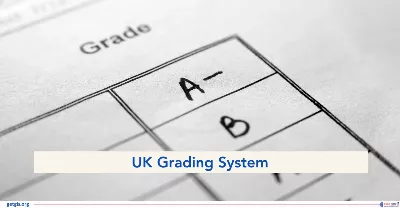Understanding the UK Grading System: The Complete Guide for International Students
Updated On
-
Copy link
The UK grading system uses classification systems like the First class honours, Upper Second (2:1) and Lower Second (2:2) to assess undergraduate degrees, with over 32% of students awarded a First in 2024 according to HESA.
Limited-time offer : Access a free 10-Day IELTS study plan curated for you

Table of Contents
- UK Grading System in Compulsory Education
- What is GCSE?
- How Does the New GCSE Grading System Work?
- Undergraduate Degree Grading System in the UK
- Grading System for Master’s Degree UK
- How are UK University Students Assessed?
- UK vs US Grading system
- Need Help Understanding the UK Education System? Seek GetGIS Study Experts
Familiarising yourself with the UK grading system is crucial for all the international students who aspire to pursue studies in the United Kingdom. The United Kingdom uses classification systems to grade the students like First Class honours, Upper Second class, Lower Second class, etc for assessment
According to a report by HESA 32% of undergraduate students in UK were awarded a First class in 2024. The grading structure in the UK not just reflects the course exam performance but also the coursework and gaining familiarity with these classifications further helps students to align their academic goals while meeting university exceptions effectively. Join us as we delve into the details of grading system in the UK.
UK Grading System in Compulsory Education
GCSE is a crucial qualification for UK students aged 15-17, influencing eligibility for further education and employment. Two grading systems exist: the old system (A to G) and the newer one (1 to 9, with 9 as the highest grade). GCSEs play a vital role in a student's academic journey, laying a foundation for future success.
Keep scrolling to understand what GCSE is and its significance in the educational tapestry.
What is GCSE?
GCSE, or General Certificate of Secondary Education, is a qualification earned by students in the UK at the end of their Year 11 schooling. It provides a standardized assessment framework in England, Wales, and Northern Ireland, while Scotland follows the Scottish Qualifications Certificates. Over two years, students study and are assessed through final exams or coursework in selected subjects.
While students have the flexibility to choose some GCSE options, certain subjects are mandatory, known as core subjects, including:
- Maths
- English Literature
- English Language
- Science (in various forms)
GCSE syllabuses, examinations, and certificates are managed by five main examination boards:
- AQA (Assessment and Qualifications Alliance)
- CCEA (Council for the Curriculum Examinations and Assessment)
- Edexcel
- OCR (Oxford, Cambridge, and RSA)
- WJEC (The Welsh Joint Education Committee)
These boards are regulated to ensure consistency among schools using different exam boards.
To know more about the UK education system, read this blog: United Kingdom Education System
How Does the New GCSE Grading System Work?
The United Kingdom has adopted the 9-1 grading system to replace the previous A* to the G system. This updated UK grading system is designed to provide more accurate evaluations of students' performance.
Let's delve into the specifics of the 9-1 GCSE UK grading system:
|
New Grading Structure |
Old Grading Structure |
Description |
|
9 |
A* |
Exceptional Attainment |
|
8 |
A+ |
Excellent |
|
7 |
A |
Equivalent to an A Grade |
|
6 |
B |
Similar to a B or low A grade |
|
5 |
C |
About on par with a C or low B grade |
|
4 |
D |
Comparable to a C grade |
|
3 |
E |
Similar to a D grade |
|
2 |
F |
Equivalent to an E grade |
|
1 |
G |
Represents the level of achievement |
|
U |
U |
Ungraded - performance did not meet the minimum requirements for passing |
Undergraduate Degree Grading System in the UK
Navigating the United Kingdom's grading system may appear formidable initially, but it is a pivotal component of the country's educational landscape.
This degree grading system in the UK bifurcates into two distinct categories:
- Academic (encompassing subjects like Mathematics and English)
- Vocational (encompassing subjects like Plumbing and Hairdressing).
Academic grades range from A* (highest) to E (lowest), while vocational levels range from 1 to 8. A* is exceptional, while C is satisfactory. To progress through courses or meet specific grade requirements, you need to complete the appropriate level of study.
The UK's grading system not only offers transparent insights into students' academic prowess but also furnishes a structured framework for ongoing learning and development. Refer to the table below for a comprehensive presentation of the UK grading system.
|
Grade Letter |
Percentage |
Grade Definition |
Honours Degree Class |
Foundation Degree Class |
|
A |
70% - 100% |
Excellent to Outstancing |
First |
Distinction |
|
B |
60% - 69% |
Good to Very Good |
Upper Second 2:1 |
Merit |
|
C |
50% - 59% |
Satisfying |
Lower Second 2:2 |
Pass |
|
D |
40% - 49% |
Sufficient |
Third |
Pass |
|
E |
30% - 39% |
Unsatisfactory |
Fail |
Fail |
|
F |
0 - 29% |
Unsatisfactory |
Fail |
Fail |
Also Read: Upcoming 2025 Intakes in UK for International Students: Apply Before its Closed
1. First-Class Degree
A first-class honor or a 'first,' is bestowed upon students scoring a minimum of 70% or higher. For those unable to focus on multiple disciplines simultaneously, pursuing a combined honor’s degree allows the attainment of a first-class degree in two different subjects, often referred to as "double firsts."
Prestigious institutions like Oxford, Cambridge, and Glasgow are known for awarding this distinction. A first-class degree showcases your passion and commitment to your field, enhancing your prospects of securing your dream job or gaining acceptance into your preferred university for further studies.
2. Upper Second-class Degree
Achieving a score between 60-69%, you earn an upper second-class degree, commonly known as a two-one degree. This degree serves as a minimum eligibility criterion for universities and employers seeking top-tier candidates. It signifies a solid command of your subject.
3. Lower Second-class Degree
Securing a grade between 50 and 59%, you obtain a lower second-class degree, affectionately known as Desmond or two-two. This grade meets the minimum requirement for consideration in traditional graduate programs or job opportunities.
4. Third-class Degree
Landing in the 40 to 49% range, a third-class degree, sometimes labeled a D-grade, indicates a narrow pass. Attained by only a small percentage of graduates, this degree offers limited options for further education and employment. As the lowest-ranking degree, receiving a third-class is likely not a distinction you aspire to achieve.
Grading System for Master’s Degree UK
You've completed your undergraduate studies and are contemplating pursuing a master's program. During this transition, you might observe that the UK's master's grading system differs slightly from the undergraduate grading system.
A typical master's degree is assessed using four categories:
- Distinction: Achieving a final grade of 70% or higher
- Merit: Attaining a final grade between 60-69%
- Pass: Receiving a final grade in the range of 50-59%
- Borderline Pass/Fail: Securing a final grade of 40-49%
Explore: Top 10 Universities in the UK for Masters
Unlike undergraduate degrees, where the system includes distinctions like 1st, 2.1, 2.2, and 3rd, master's degrees in the UK are typically graded as Distinction, Merit, and Pass.
The table below offers a comparative overview of the two grading systems.
|
Percentage |
Bachelor’s Degree Grade |
Masters Degree Grade |
|
70% and above |
1st |
Distinction |
|
60% - 69% |
2:1 |
Merit |
|
50% - 59% |
2:2 |
Pass |
|
40% - 49% |
3rd |
Fail/Borderline Pass |
How are UK University Students Assessed?
The following factors are also considered when assessing university students in addition to the grading system
- Exams: Evaluate students' knowledge and understanding through written assessments.
- Coursework: Includes essays, reports, projects, presentations, and lab reports to gauge practical and theoretical skills.
- Oral Assessments: Measure students' ability to communicate effectively.
- Practical Assessments: Assess the application of theoretical knowledge in practical scenarios.
- Portfolios: Compilation of a student's work, commonly found in art or fashion programs.
- Dissertations: Large research projects completed in the final year, demonstrating in-depth understanding and research skills.
UK vs US Grading system
In the UK grading system, exams, dissertations, and final semester work carry more weight than the GPA, which is an average of marks throughout the academic year. Unlike the US, the UK uses letter grades differently, with an A starting at 70%, and each subsequent letter representing a 10% reduction. A failing grade in the UK is below 39%, allowing for obtaining a degree, a concept not applicable in the US.
|
Degree Class |
Percentage Score |
US Grade |
|
First Class |
70% - 100% |
A |
|
Upper Second Class |
60% - 69% |
B+ |
|
Lower Second Class |
50% - 59% |
B or B- |
|
Third Class |
40% - 49% |
C+ or C or C- |
|
Fail |
0 - 39% |
F |
Need Help Understanding the UK Education System? Seek GetGIS Study Experts
As we conclude the UK grading system holds a pivotal role in evaluating the academic performance of students and future career opportunities. While understanding the grading structure and classifications is crucial for international students, familiarising yourself with the UK Education System helps you effectively navigate through your study journey in the country.
For personalised study abroad guidance including admissions assistance, study options, etc, consider reaching out to GetGIS. Our team provides end to end assistance to simplify your journey to UK education success.
Also Read
- Tags
- Study Abroad
Limited-time offer : Access a free 10-Day IELTS study plan curated for you

Frequently Asked Questions
How are grades determined in the university grading system in the UK?
Can UK grades be converted to GPA?
How do I convert my GPA to UK grades?
- Above 80%: 10 GPA
- 75-79%: 9 GPA
- 70-74%: 8 GPA
- 60-69%: 7 GPA
- 50-59%: 6 GPA
- 45-49%: 5 GPA
- 40-44%: 4 GPA
What is the passing grade for GCSE?
What if you don’t achieve the honor degrees?





